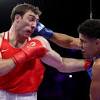Wales star punched France player to stun rugby viewers

Some moments in international rugby stop you right in your tracks.
Sport played at the highest level can see emotions running high - after all, a great deal is at stake when representing your country.
But some things need to be seen to be believed.
Such as when Arwel Thomas, the quiet Wales fly-half, known more for his rugby brains than his brawn, landed an almighty blow that left his opponent on the deck during an international match between France and Wales.
Let’s take the story back to a couple of decades ago, to 1997 in fact. Thomas, the Wales No 10, became embroiled in a scuffle with Les Bleus scrum-half Philippe Carbonneau then bam - a right hook landed leaving the Frenchman on the floor just minutes into the match in Paris.
SIGN UP: Get the new exclusive Inside Welsh rugby newsletter for full insight into what's really going on around all the big issues - including the exceptions still present in the 25-cap rule. This special offer will get you full access for the entire year for just £10 instead of £40.
Happily, after staying down for what seemed an age, the notoriously feisty Carbonneau rose to his feet with a bruised ego and little else to moan about.
The pair later became team-mates and great friends. Which begs the question even more, what prompted the incident that took the rugby world by complete surprise?
Wales had started the 1997 Five Nations with a stylish win over Scotland at Murrayfield, with Allan Bateman, Scott Gibbs, Dai Young and Scott Quinnell returning from rugby league to help Kevin Bowring’s side post a swaggering 34-19 success in which Thomas played a starring role.
But they lost their next match at home to Ireland and would succumb comprehensively to England in the final game of the Championship.
In between, they went to France, who were menacingly powerful at the time, with the likes of Jean-Luc Sadourny, Stephane Glas and Christophe Lamaison behind and Christian Califano, Abdel Benazzi and Fabien Pelous up front.
Les Bleus had won 14 of 16 previous games in the fixture, some of which saw Wales barely offering an argument.
Wales came up with one of their better performances, albeit one that ended in defeat. Bateman, in particular, stood out with his ability to cut the defensive line. Indeed, he made so many line-busts that day at Parc de Princes that one travelling Welsh supporter call him Allan Breakman.
Thomas, who went on to work as a representative for a company that sells dental products, recalls: “The rugby league boys had come back and Bateman had a great game.
“I remember I was rooming with Gibbsy the night before the game and I was struggling to sleep. He wasn’t best pleased, saying: 'For heck's sake, get to sleep' — and I’m giving you the version you can use in the paper.
“What can you say? You’re pretty much a kid, you’re in a foreign country and it’s all exciting. There’s stuff racing through your head and sleeping is difficult.
“We should have won, but maybe France had luck on their side and a bit more belief than we had. They took us on a boat afterwards for a few beers. It was brilliant, old-school stuff and how it should be.”
Wales scored tries through Gareth Thomas, Bateman and Rob Howley but couldn’t get past the winning post, with France replying through two touchdowns from Laurent Leflamand and one apiece from Oliver Merle and David Venditti en route to a 27-22 win.
What caused the dust-up? “It happened in the heat of the moment,” reflects Thomas. “He sort of pushed me under my chin and into my face. I just reacted stupidly by turning around and punching him in the face.
“That was about it. He was in ‘you’re not going to mess with me’ mode. But then I hit him back.
“It was a bit silly, not least because it was on TV and there were close on 50,000 people in the stadium. It was always going to cause a potential problem.
“Straightaway, I thought I might be off,” he says. “They replayed the incident and the crowd made a heck of a noise. I thought: ‘Oh, no!’
“But Wayne Erickson was the touch judge. I’d spent six months out in Australia playing rugby for Easts, which just happened to be his rugby club and I had got to know him. He came on and gave Wales a penalty.
“In fairness to Wayne, he’d seen Carbonneau hitting me first and that probably influenced his call. But let’s just say I was fortunate to have been given the benefit of the doubt.
“Really, I should have gone. If you punch somebody in the face you should not stay on the field.”
When Thomas left Welsh rugby to try his luck with Pau in 2003, one of the first people he came across at his new club was his old partner in pugilism from six years earlier, Carbonneau.
“He ended up being my captain in France when I played out there,” laughs Thomas. “We had some stick initially but they made us training partners.
“I got quite friendly with him and his family. He was a brilliant rugby player, one of the best I played with or against.
“It’s a strange one, though. I played rugby for a long time yet people always seem to want to talk to me about the Carbonneau incident.

“My son Harri is even asked about it by his mates at school. It was all over in the blink of an eye — a shove in the face, a punch and a French crowd whistling and roaring for a visiting player to be sent off. Yet it just seems to stick with a lot of people.”
Another former France scrum-half Pierre Berbizier once declared: “If you can’t take a punch, you should play table tennis.”
It was the way it used to be in the madhouse that was French rugby at the time, gnarled and uncompromising forwards to the fore. Acts that would earn dismissals and long bans were they attempted today still blighted the game back then.
Violence was a particular problem over there. But on this occasion it was a comparative flyweight in a Wales No. 10 jersey who swung and connected.
It was hopelessly out of character but the episode is remembered by so many. The BBC co-commentator that day watched the slow motion replay and said: "Arwel took the punch first. No messing: Arwel put it straight back on his jaw — well done."
Were such comments made nowadays, they would trigger a social media frenzy. But two decades ago they barely prompted a reaction.
Different times. Vive la difference, as they may or may not say in Trebanos.


 United Kingdom
United Kingdom Argentina
Argentina  Australia
Australia  Austria
Austria  Brazil
Brazil  Canada
Canada  Germany
Germany  Ireland
Ireland  Italy
Italy  Malaysia
Malaysia  Mexico
Mexico  New Zealand
New Zealand  Poland
Poland  South Africa
South Africa  United States
United States 




























